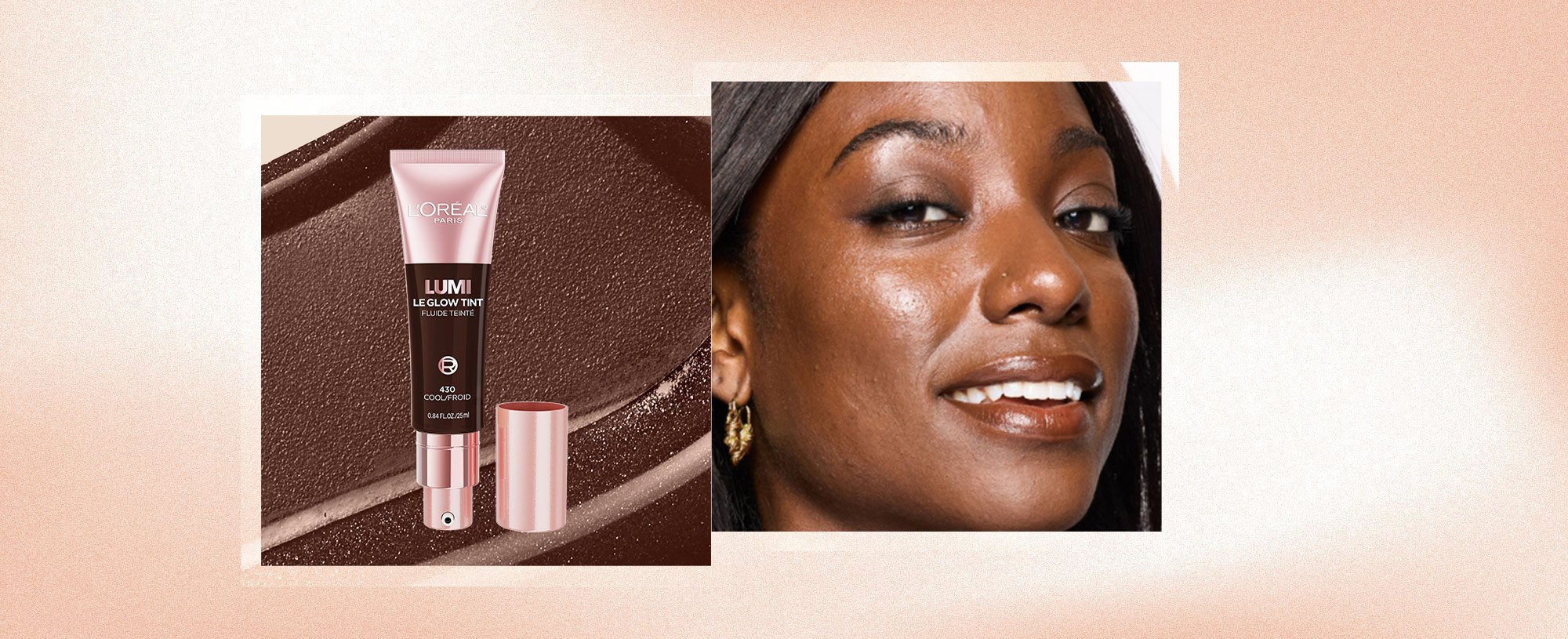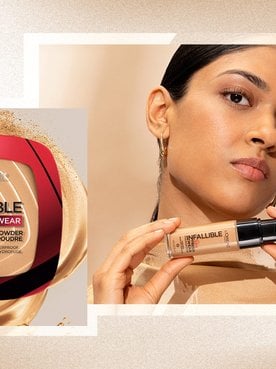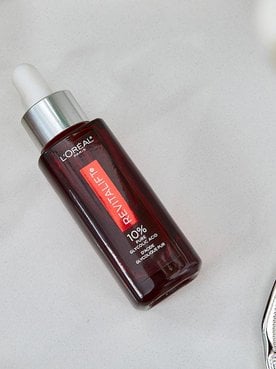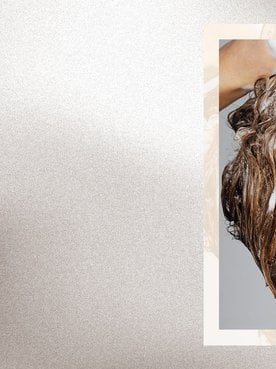With so many different foundations to choose from, it’s easy to rely on recommendations from social media influencers, friends, and family. However, if you’ve ever dealt with foundation mishaps after trying out a new formula (like sliding, pilling, or flaking), you might not be using the right type of foundation for your skin’s needs. There are two main types of liquid foundations—water-based foundations and silicone-based foundations—that can have a big impact on how your makeup turns out.
Ahead, we’re helping you uncover which type of foundation is best for your skin type and personal preferences. We’ll break down the key differences between water-based vs. silicone-based foundations and share their top benefits. Plus, we’ll also introduce you to a few of our favorite silicone-based foundations to consider adding to your makeup routine.
What Is a Water-Based Foundation?
Water-based foundation is a type of foundation that’s formulated with water as its base. These foundations normally don’t contain silicones and will usually have water listed among their top three ingredients. If a water-based foundation does contain silicones, it’s often in such small quantities that it won’t be mentioned until further down on the product’s ingredient list.
- Formula: Water-based foundations tend to have a liquid consistency, lightweight texture, and a breathable, natural-looking finish. Many formulas also offer moisturizing benefits, making them perfect for achieving a fresh-faced and dewy look.
- Best for: Most skin types can benefit from using water-based makeup. Its hydrating properties help replenish moisture in dry or dehydrated skin, while non-comedogenic ingredients are generally gentle enough for sensitive or acne-prone complexions.
- Pros:Water-based foundations are usually thinner than their silicone- or oil-based counterparts, allowing for buildable coverage that doesn’t look thick or caked-on. Plus, their lightweight texture ensures a fresh, dewy look, maintaining hydration and radiance without excess shine.
- Cons: If you want full coverage, you may find that water-based foundations are too sheer for your needs.
Who Should Use a Water-Based Foundation?
Shop the Product
Generally speaking, water-based foundations are suitable for all skin types (depending on the formulation). Most water-based foundations are formulated without silicones or oils, which makes them a popular choice among people with oily skin and acne-prone skin. Their high water content may also offer hydrating benefits for those with dehydrated or dry skin. The best water-based foundations offer a breathable texture and lighter coverage that allows your natural skin texture to come through. They’re also perfect if you prefer a radiant, youthful, and natural-looking finish.
If those are the results you want from your foundation, consider adding the L’Oréal Paris Lumi Le Glow Skin Tint to your makeup bag. This lightweight, water-based tinted formula boasts reflective pearls, blurring pigments, and an 82 percent hydrating serum to provide a healthy-looking, soft-lit glow. It also feels weightless on your complexion for a breathable, second-skin finish.

What Is a Silicone-Based Foundation?
Instead of using water as a base, silicone-based foundations are made with silicones, such as dimethicone. These foundations will typically contain silicones within their top three ingredients. If you notice ingredients ending in -cone or -siloxane at the top of the ingredient list, it means that the foundation is probably a silicone-based product. Like most liquid makeup products, silicone-based foundations will usually still contain some amount of water in their formulas. Water may even appear first in the ingredient list.
- Formula: Silicones are used in makeup products designed to give your complexion a silky, smooth appearance and a blurred, filter-like finish. These formulas add a layer on top of your skin that may help disguise large pores and create a smoother canvas for makeup application.
- Best for: Foundations made with silicones are particularly beneficial for those with uneven skin texture, as they can help blur imperfections like visible pores, fine lines, and wrinkles. They’re also great for creating full-coverage makeup looks.
- Pros: Silicone-based foundations are especially well-known for their staying power, and many makeup artists prefer these formulas when creating long-lasting, full-glam looks. So, if you don’t want to worry about having to touch up your makeup, a silicone-based foundation may be your best bet. (Still, we recommend specifically seeking out long-wear products—don’t just assume any silicone-based formula will last all day.)
- Cons: Depending on the formula, silicones can potentially clog your pores and may feel heavy or greasy on your skin. They may also pill when layered with other types of products (more on that later).
Who Should Use a Silicone-Based Foundation?
People with most skin types can find a silicone-based foundation that’s suitable for their needs, which makes these foundations super-versatile. Silicone-based foundations are generally more mattifying than water-based foundations, but you can find them in a wide variety of finishes to suit different preferences. With that said, they’re especially popular among those with combination and oily skin types. If your skin is acne-prone, you also may be able to use a silicone-based foundation, but it’s essential to look for formulas that are non-comedogenic.
How To Tell if a Foundation is Water-Based or Silicone-Based

Identifying whether your foundation is water-based or silicone-based is simple—just flip the product over and read the ingredients on the back of the packaging. Most liquid foundations will include water high in the ingredient list, so don’t use this alone to determine whether a foundation is water- or silicone-based. As mentioned earlier, silicone-based formulas will contain some form of silicone within the top three ingredients. These are typically words that end in -cone or -siloxane. If you don’t see any silicones early in the ingredients, and you do see water, it’s likely a water-based formula.
4 Silicone-Based Foundations To Try
Keep reading to discover some of our favorite silicone-based foundations for any glam or casual makeup look.
Shop the Products

L’Oréal Paris True Match Super Blendable Foundation comes in 45 shades to match all skin tones and undertones. It’s designed to adapt to any skin color and texture and is suitable for all skin types—including sensitive skin. We recommend giving this foundation a try if you want a lightweight, hydrating formula that provides medium coverage and a skin-like finish. And, like many L’Oréal Paris foundations, it’s oil-free, fragrance-free, and won’t clog your pores.
L’Oréal Paris True Match Hyaluronic Tinted Serum
Reach for L’Oréal Paris True Match Hyaluronic Tinted Serum if you like the idea of a lightweight foundation that also doubles as a facial serum. This tintedserum-foundation hybrid with 1% hyaluronic acid leaves your skin looking brighter, hydrated, and more luminous over time. It comes in 14 shades to match a wide range of skin tones and gives your complexion a natural, radiant finish.
L’Oréal Paris Infallible 24 Hour Fresh Wear Foundation
This liquid foundation is suitable for all skin types and offers medium-to-full, buildable coverage. The ultra-thin liquid with broad-spectrum SPF 25 goes on smoothly to give your complexion a fresh, even, and healthy-looking appearance. It’s available in 40 shades and makes a great option for long-lasting coverage that’s transfer-resistant, non-comedogenic, and dermatologist-tested.
L’Oréal Paris Infallible Pro-Matte Foundation
If you prefer a matte foundation, try this one. The long-wear liquid formula lasts up to 24 hours without falling flat and it boasts an air-light, creamy texture that dries down to a demi-matte finish. It’s ideal for blurring imperfections and smoothing your skin texture. Plus, it even contains SPF 15 for some added sun protection.
Should You Match Your Foundation With Your Primer?
Shop the Products
Many makeup artists recommend choosing a foundation and primer that have the same base, as these products may be more compatible. So, if you absolutely love your silicone-based primer, you might want to consider exploring silicone-based foundations. Meanwhile, a water-based foundation will likely pair better with a water-based primer. Using makeup products with compatible bases can help keep your foundation from coagulating on your skin and help you achieve a smooth, even texture.
We love pairing silicone-based foundations with silicone-based primers like the L’Oréal Paris Prime Lab Up to 24H Pore Minimizer. This silky-textured primer is ideal for greasy and shiny skin but can be used by all skin types (including sensitive skin). It helps smooth your skin over time and has a blurring effect that instantly improves the look of large pores. If you prefer a more luminous base to pair with your silicone makeup, try the L’Oréal Paris Lumi Glotion Natural Glow Enhancer, Face and Body. Infused with glycerin and shea butter, this viral TikTok favorite can be worn under, over, or in lieu of foundation. It also functions as a moisturizer, highlighter, and contour, making it a versatile addition to your routine.
Next Up: How To Find Your Perfect L’Oréal True Match Foundation and Concealer Shades
Photo courtesy of L’Oréal Paris







